
Unions prepared if right-to-work battles surface
Kasich denies plans; Ohio Democrats remain wary
9/1/2014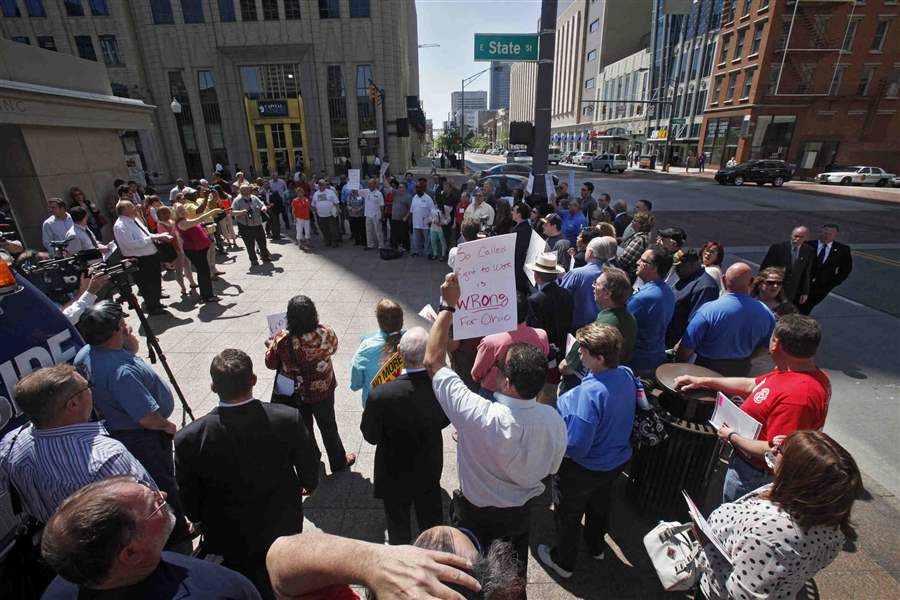
The AFL-CIO protests proposed right-to-work legislation on the southrast corner of the Statehouse on May 1, 2013, in Columbus.
COLUMBUS DISPATCH/TOM DODGE
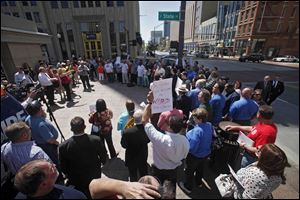
The AFL-CIO protests proposed right-to-work legislation on the southrast corner of the Statehouse on May 1, 2013, in Columbus.
Toledo’s union workers will celebrate the American labor movement today by taking to the downtown streets and marching in organized fashion in the annual Labor Day parade.
The way many Ohio labor leaders and Democratic allies see it, that could be good practice for the near future if their worst fears materialize.
With the state’s gubernatorial election just two months away, union leaders and Democratic party officials are casting a suspicious eye toward Gov. John Kasich, wondering just how the Republican incumbent will respond, if he is re-elected, to any future effort to make Ohio a “right-to-work” state.
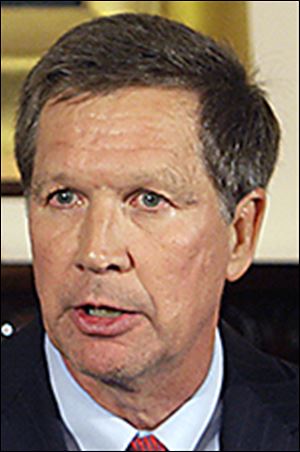
Kasich
“The governor has said that is not on his agenda. But so did Gov. [Rick] Snyder in Michigan and [former Gov.] Mitch Daniels in Indiana, and look what happened there,” UAW Region 2B director Ken Lortz said of Ohio’s neighboring states, both of which enacted right-to-work laws in 2012.
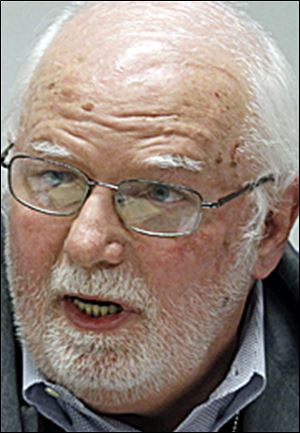
Ruvolo
“I’m not going to let my guard down. Whatever happens, we’re going to be prepared,” Mr. Lortz said.

Redfern
Right-to-work laws prohibit mandatory participation in a workplace union and forbid unions from levying “fair share” fees on nonmembers who benefit from union negotiation and representation. Right-to-work bills were introduced in the Ohio legislature in 2013, and in 2012 petitions were circulated to get a right-to-work state constitutional amendment on a future ballot.
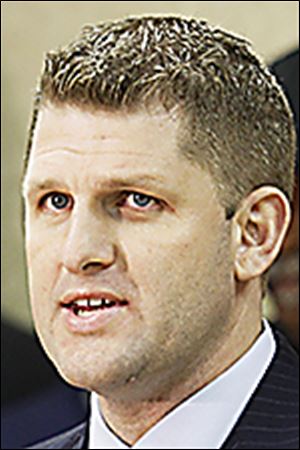
Szollosi
Mr. Kasich has stated several times that the right-to-work issue is “not on my agenda,” but organized labor and Democratic leaders say they’re disinclined to believe him, given the pressure he might face from fellow Republicans to push the issue.
“We couldn’t be more emphatic on this issue. We’ve stated over and over that it’s not on his agenda,” Rob Nichols, the governor’s spokesman, said Friday when asked if Mr. Kasich’s position has changed any.
But Toledoan Jim Ruvolo, a political consultant and former Ohio Democratic Party chairman, is certain the right-to-work issue will surface immediately if Mr. Kasich is re-elected. The issue might have a good shot at passage, given recent state redistricting by the GOP, he added.
“I don’t have rose-colored glasses on when it comes to [Mr.] Kasich and his supporters. These folks are ideologues, and they will push it. And he has a lot of strength to go after it,” Mr. Ruvolo said.
“The legislature will try to pass it, given the makeup of that legislature, and if they do, [Mr.] Kasich would be hard-pressed not to sign it, no matter what he says now,” Mr. Ruvolo said. “If he intends to run for president, he not only has to sign it, he has to push it, because that’s what the Republican Party would expect him to do.”
Ohio Democratic Party Chairman Chris Redfern also sees a right-to-work fight coming sooner rather than later.
“If past is prologue, John Kasich always tries to be somebody he’s not before the campaign, and he morphs back to his Tea Party roots after the campaign,” Mr. Redfern said. “He is not a friend of working families. His policies have reflected that time and time again.”
Mr. Redfern points to Mr. Kasich’s first year as governor to show where he would be on right-to-work.
“Look at his first legislation after he became governor — Senate Bill 5,” Mr. Redfern said.
The bill aimed to restrict collective bargaining rights of public employees, but it was rejected in a voter referendum, with more than 61 percent voting against it.
“It’s traditional that your first legislation reflects who you are. So we ought to all be prepared for right-to-work because it’s coming,” Mr. Redfern said.
However, Matt Szollosi, a Democratic former state representative from Oregon who is now executive director of the Affiliated Construction Trades of Ohio, said Mr. Kasich might not push for right-to-work — even though many believe the governor favors it — because the political support for it isn’t there.
“I think the likelihood that a right-to-work initiative is passed by the legislature is extremely slim. The Republican senators and representatives that I’ve worked closely with are focused on economic and industrial development and education issues, and in my interaction with the legislature there does not seem to be much of an appetite for a right-to-work fight,” Mr. Szollosi said.
State Rep. Kristina Roegner (R., Hudson), the primary sponsor of a right-to-work bill introduced last year in the General Assembly, agrees with Mr. Szollosi that a right-to-work fight isn’t likely.
“I’m unaware of any such effort. I did introduce a bill, I did my research, and economically, I believe it’s a good thing for Ohio,” Ms. Roegner said.
“Polls show Ohioans are supportive of right-to-work, so I firmly think it’s the right thing to do,” she added.
“But my understanding is the General Assembly and the governor, they just don’t have an appetite for it. Of course, I cannot speak for the governor or the speaker or the Senate president,” she said. “But while I think it’s the right thing to do, they have not indicated to me that they want to take up that issue.”
“Don’t get me wrong. While I would like to see it happen, I’ve not heard anything to indicate that it would,” Ms. Roegner added.
Mr. Szollosi said it’s possible that right-to-work bills will be reintroduced after November.
“But I highly doubt whether they’ll get any traction,” he said.
As for Governor Kasich, Mr. Szollosi said the stinging defeat of Senate Bill 5 was a clear message by Ohio’s voters that they don’t want to see labor rights restricted.
“The administration and the legislature are most certainly aware of what happened in 2011, and to their credit, I don’t think they’re interested in running into that kind of fight anytime in the near future,” Mr. Szollosi said.
Tim Burga, Ohio AFL-CIO president, said he can’t predict whether right-to-work will surface after the election, or whether it would have any chance of passing.
“But we’ve been talking to our members in Ohio for the last couple of years whenever the extremists start to introduce these laws into states, and we’ve told them not to be taken in,” he said.
“I can’t predict what might happen, but I can tell you there’s very little support for this,” Mr. Burga said. Also, he added, organized labor won’t be caught off guard.
“We are assembling a campaign team that would be prepared to do our level best to make sure that we have a statehouse presence in the state and around the state if right-to-work surfaces,” Mr. Burga said. “We are already getting a campaign team in place.”
Contact Jon Chavez at: jchavez@theblade.com or 419-724-6128.